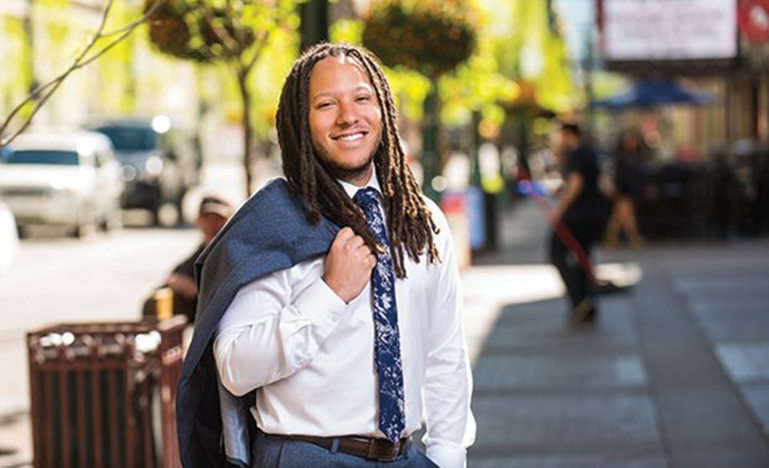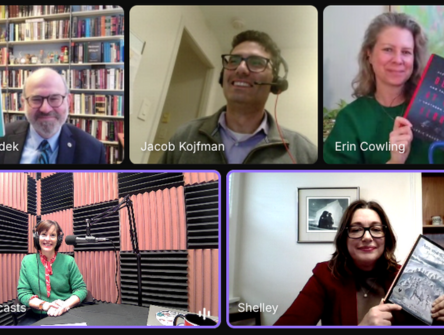A basic right
A once radical idea to guarantee citizens an income has practically gone mainstream. Will our courts be tempted to embrace it?

Dismissed for years as a utopian thought experiment, the concept of a basic guaranteed income is now enjoying a renaissance as fears about automation and technological unemployment are on the rise.
The speed at which basic income has snowballed onto the public agenda has been astonishing. How to translate the idea into law is another matter altogether. If the past is any indication, decisions on welfare will likely remain a task for elected lawmakers. But could we see the day when the courts step in and rule that the Canadian Charter protects economic rights, even a basic income guarantee, as fundamental to human survival?
“The very common response is that it’s beyond their jurisdiction. I don’t see that changing in the short-term,” said Margot Young, a professor in the Allard School of Law at the University of British Columbia, and expert in constitutional and social justice law. “Courts don’t take into account broad social changes overnight.”
For now, courts generally see the Charter’s main task as protecting individuals from state encroachment – described as negative rights – and not from destitution.
But popular opinion has been known to have an impact on judicial decision-making, as recent cases on assisted dying and the striking down of prostitution laws have shown. So if society starts to see freedom from poverty as a fundamental right – thanks in part to movements that call for a government-set basic income – how long before courts do, too?
After all, judges are bombarded, just like everyone else in the world, with dire warnings of mass unemployment due to the twin forces of globalization and automation – warnings that aren’t simply the usual line from poverty activists.
For now, governments are the ones grappling with the consequences of flat-lining wages, a widening wealth gap and economic insecurity that have come with the so-called “fourth industrial revolution.”
Nearly half of all jobs in the U.S. will be in danger in the next 20 years, researchers at Oxford University estimate. Economists from the Bank of England, Citigroup and other financial institutions and think tanks have expressed similar dire sentiments. Employment may no longer be a question of choice.
“Without urgent and targeted action today to manage the near-term transition and build a workforce with future-proof skills, governments will have to cope with ever-growing unemployment and inequality, and businesses with a shrinking consumer base,” Klaus Schwab, chairman of the World Economic Forum, warned at the organization’s January meeting in Davos.
The provision of some form of basic income guarantee, say proponents, is inescapable given the outlook. “Without something like it, we are going to see increasing inequality and chronic insecurity,” says British economist Guy Standing, author of The Precariat: The New Dangerous Class, and a co-founder of the
Basic Income Earth Network.
Political instability is also a concern, as the recent Brexit vote has made all too clear. Worries abound that weaker earning power, coupled with government cuts to services, has meant more people are slipping down the economic pole and into the arms of demagogues like Donald Trump, France’s far-right leader, Marine Le Pen and Nigel farage, the leader of leader of the United Kingdom Independence Party. On the left, globalization skeptics like Bernie Sanders in the U.S. and Jeremy Corbyn in the U.K., are also gaining supporters and upending the centrist political establishment.
The idea of a basic guaranteed income is hardly new. Whether it’s called “basic,” “universal” or a “citizen’s income,” philosophers and politicians of all political hues, from Thomas Paine and John Stuart Mill to Richard Nixon, have at times promoted the notion of distributing some standard sum of money to citizens regardless of circumstance. A slew of Nobel prize-winning economists at different times have come out in favour, including Joseph Stiglitz, James Tobin, Milton Friedman, James Buchanan, and Paul Krugman, to name a few.
If some on the right like the idea, it’s because it promises to dismantle the bulk of social programs and replace them with what appears to be a simpler system, with potential savings in both administration and health costs. Former Conservative Senator Hugh Segal has been pushing basic income for decades.
Canada experimented with such a scheme in the early 1970s, with the so-called Mincome project in Dauphin, Manitoba. The program was scrapped in the 1980s without a final report, so results are somewhat inconclusive.
But the idea is now being discussed and tested in Finland, the first country to effectively put basic income back on the map thanks to a citizen’s initiative launched in 2012. The Netherlands and New Zealand also plan to try it out, despite the usual worries over potential costs and possible effects on work incentives.
Switzerland, a country associated with business-friendly conservative politics as well as the direct form of democracy, will hold the world’s first national referendum on basic income this June. Citizens there are being asked to decide whether the country’s constitution should require the state to provide an “amount high enough for people to live off in dignity.” The government has advised people to vote against it, and most experts think politicians will get their way. But as of this writing, polls pointed to growing support.
“People will have to weigh efficiency versus fairness,” said Felix Oberholzer at Harvard Business School, who is Swiss. “In Switzerland, efficiency usually wins.”
Closer to home, the basic income movement is gaining traction once again, says Jonathan Brun, co-founder of Revenu de base Quebec and the Quebec spokesperson for Basic Income Canada. Europe’s dabbling in this area is certainly helping spread the word in Canada, “but it’s also a recognition that the current economic stagnation is going to take a different type of thinking” to fix, Brun adds.
In February, the Ontario government said it will test the basic income concept later this year. Officials have yet to release any specific details of the project — including how much will be given to residents who participate — but it could become permanent depending on the outcome of the study, according to some reports. The Quebec government recently said it will study the issue, led by Employment Minister François Blais, who wrote a book in 2001 called A Basic Income for All.
These announcements follow the endorsement of basic income by a slew of Canadian mayors, including those from Calgary, Edmonton, Halifax, Victoria and St. John’s, Newfoundland, and other local and provincial governments. The Canadian Medical Association is lending its support to the idea. The Green Party
is also in favour.
“The signs in recent months have become rather promising, both in Quebec and Canada more broadly,” said Jurgen De Wispelaere in an email. De Wispelaere is a senior researcher at the University of Tampere in Finland, where he is a member of the working group preparing the basic income experiment to take place in January 2017.
In Ottawa, the newly empowered Liberals haven’t made any promises, though Families, Children and Social Development Minister Jean-Yves Duclos, who has been tasked with finding a strategy to combat poverty, said it’s worth talking about.
“There are many different types of guaranteed minimum income,” Duclos said in a recent interview with The Globe and Mail. “I’m personally pleased that people are interested in the idea.”
That Ottawa is paying attention to basic income is telling. If more jurisdictions opt to recognize economic rights, pressure on Canadian legislators will likely increase, says Gerard Kennedy, an associate at Osler, Hoskin & Harcourt LLP in Toronto.
What’s more, Canadian opinion on economic rights may evolve, perhaps even to such an extent that judges feel compelled to re-think how our rights, outlined in a “living tree,” should be interpreted.
“The Charter is drafted in broad language to take into consideration evolving societal attitudes,” said Joshua Sealy-Harrington, a litigator at Blakes LLP in Calgary. “Similarly, the Supreme Court considers public importance when deciding which cases it will hear, a factor linked to societal attitudes.”
“Courts are always not too far ahead and not too far behind our cultural norms – look at the change that occurred in judicial decisions on same-sex marriage,” says Kerri Froc, a postdoctoral fellow at Carleton University. “They evaluate constitutional arguments based on judicial common sense – whether they are ‘off the wall’ or ‘on the wall,’ ” she adds in an email, citing Yale law professor Jack Balkin. “Part of that assessment of whether an argument is ‘off the wall’ depends on the social culture that we and judges are immersed in.”
A constitutional change like the one that Switzerland is currently contemplating is out of the question in Canada, even if activists see the inclusion of a right to a minimum standard of living — however that is defined — as the ultimate goal.
And yet, to ensure that basic income remains in place, it would have to be covered under the Charter, said Brun. “Long term, having some sort of guarantee of dignity is key. It has to be recognized as a right on the same level as the right to vote.”
“It makes sense to look for a more permanent situation — something to prevent us from ever going back to a punitive model,” said Sheila Regehr, chair of the Basic Income Canada Network.
At the moment, the Supreme Court is far from that position. But since the Charter’s adoption in 1982, legal experts have debated whether it should be interpreted as including an explicit right to be free from poverty, and not just providing for negative rights.
So far, activists have been largely unsuccessful in getting the courts to recognize economic rights as a foundation for other rights under the Charter. And given recent setbacks, there is no clear path forward.
Most cases arguing for economic rights invoke Section 7, the right to life, liberty, and security of the person, which is broadly read as protection against abusive state action. Section 15, which states that individuals must be treated equally regardless of race, religion, national or ethnic origin, colour, sex, age or physical or mental disability, has also been used.
A first challenge — in Gosselin v. Quebec in 2003 — did not go the claimant’s way in arguing that citizens have a constitutional right to an adequate level of social assistance. But certain passages in the ruling continue to give activists a toe-hold. Arguing that this particular case did not prove a violation, Chief Justice Beverley McLachlin nevertheless left the door ajar to “the possibility that a positive obligation to sustain life, liberty, or security of the person may be made out in special circumstances.”
In her dissent, Justice Louise Arbour argued that the Charter could and should be read as placing a positive obligation on the state to provide for its citizens. “This Court has consistently chosen … to leave open the possibility of finding certain positive rights to the basic means of subsistence within s. 7. In
my view, far from resisting this conclusion, the language and structure of the Charter — and of s. 7 in particular — actually compel it.”
It is open to debate what McLachlin meant by “special circumstances.”
“Although ‘special circumstances’ could seem to imply facts on the ground, such as changing economic times, I think the Chief Justice more likely meant one of two things,” said Carissima Mathen, associate professor of law at the University of Ottawa, in an email. “First, circumstances in which actions or statements by the state would support imposing a certain obligation on it to act. Second, changes in the legal landscape that would create a more accommodating framework in which to recognize a positive right.”
Some believe the state would need to act first in terms of legislating economic rights. “It is unlikely that Canadian courts will take the lead in re-shaping Canadian society, despite the growing consensus in Canadian society of the need to adopt measures to reduce poverty,” said Leticia Morales, who teaches at the Sussex Law School, in an email.
“One thing is that government adopt a [basic income] policy and then courts have to deal with interpreting the policy. Another thing is to predict how Canadian courts are going to behave in the future when the government hasn’t adopted any new measure in this area. My guess is that they will remain in a conservative position in this matter.”
The fact that programs like a basic income guarantee require unknowable and finite financial resources to be paid for by taxpayers greatly complicates this issue if there is no clear mandate. Where the state would be forced to spend public money as a result of a court’s decisions, judges will be even more disinclined to get involved.
Even Canada’s health care is likely not constitutionally mandated, says Osler’s Kennedy. “The reasons why the courts did not read positive rights in the Charter previously are still very much around,” he says. “The Charter is clearly meant to fundamentally be a document that protects civil and political rights — not social welfare rights.”
But nothing is set in stone. “If society can change its mind on an issue, so can judges. They do consider societal attitudes,” said Sealy-Harrington.
The Charter has shown itself to be flexible, and as Sealy-Harrington argues, “special circumstance” is about as open to interpretation as things get. “The state doesn’t have to act first,” said Sealy-Harrington. “In fact, it’s [the state’s] inaction that could be called into question.”
He muses that the current housing crisis in Canada, together with the fact that we are the only G8 country that does not have a national housing strategy — something that the United Nations
recently highlighted in a special review — could qualify as a special circumstance.
“But seeking to establish positive rights under the Charter will be an uphill battle, even just to get heard,” he says.
In fact, the Supreme Court of Canada last year refused to hear a positive rights case related to housing that was rejected in a lower court. In Tanudjaja v. Canada, claimants argued that a lack of social housing violates Charter guarantees of security of the person and freedom from discrimination through government inaction. Lower courts said the case was not justiciable.
The real question is: Is the notion that the state should provide not just for children, the elderly and the disabled, but also for all citizens regardless of circumstance, really gaining ground?
Proponents of basic income may be found on both ends of the political spectrum.
But not everyone is enthusiastic. Critics point to the potential high cost and administrative nightmare of trying to push such a program through. The Fraser Institute, Canada’s leading right-wing think tank, called the challenges “likely insurmountable.” Meanwhile, a headline in Britain’s influential The Economist
magazine last year declared the concept of basic income
“Basically Unaffordable.”
Other critics compare it to a form of quantitative easing that will create an underclass of unskilled workers who are fed basic sustenance while the privileged continue to thrive at work.
Even poverty activists are divided. On the left there are those who believe that such a strategy could actually backfire and provide less assistance to the poor. A basic income guarantee “is simple only in name. You could actually end up with a worse position,” says Young.
For many, it remains what it always was: an interesting thought experiment to be rejected at the implementation stage.
Nor do some think that the bleak employment predictions are warranted, particularly now that the U.S., still the world’s largest economy, is enjoying nearly full employment. There is also a view that technological unemployment is a myth, and that in the words of American writer Matt Yglesias, “machines are replacing workers… but they’ve been doing so since the cotton gin and the spinning jenny.”
Others point to the greying of the population as a much bigger concern. For them, the robots won’t come fast enough.
Much will depend on how workers adjust to an economy constantly lebveraging new technologies.
“The increased precariousness is affecting everyone. It’s a different world,” said Regehr, who is not in the least concerned that interest in basic income will fizzle out, as it has in the past. “The pressures out there that are driving this movement will intensify: the increasing costs of healthcare and inequality — the costs of poverty itself. Those pressures are not going to go away.”


